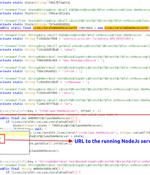Security News

A new Android malware campaign spreading the latest version of GravityRAT has been underway since August 2022, infecting mobile devices with a trojanized chat app named 'BingeChat,' which attempts to steal data from victims' devices. According to ESET's researcher Lukas Stefanko, who analyzed a sample after receiving a tip from MalwareHunterTeam, one of the notable new additions spotted in the latest version of GravityRAT is stealing WhatsApp backup files.

An updated version of an Android remote access trojan dubbed GravityRAT has been found masquerading as messaging apps BingeChat and Chatico as part of a narrowly targeted campaign since June 2022. "Notable in the newly discovered campaign, GravityRAT can exfiltrate WhatsApp backups and receive commands to delete files," ESET researcher Lukáš Štefanko said in a new report published today.

Over 60,000 Android apps disguised as legitimate applications have been quietly installing adware on mobile devices while remaining undetected for the past six months. The malicious apps are not hosted on Google Play but on third-party websites in Google Search that push APKs, Android packages that allow you to manually install mobile apps.

Google has released the monthly security update for the Android platform, adding fixes for 56 vulnerabilities, five of them with a critical severity rating and one exploited since at least last December. The new security patch level 2023-06-05 integrates a patch for CVE-2022-22706, a high-severity flaw in the Mali GPU kernel driver from Arm that Google's Threat Analysis Group believes it may have been used in a spyware campaign targeting Samsung phones.

Google has released the monthly security update for the Android platform, adding fixes for 56 vulnerabilities, five of them with a critical severity rating and one exploited since at least last December. The new security patch level 2023-06-05 integrates a patch for CVE-2022-22706, a high-severity flaw in the Mali GPU kernel driver from Arm that Google's Threat Analysis Group believes it may have been used in a spyware campaign targeting Samsung phones.

Thousands of adware apps for Android have been found to masquerade as cracks or modded versions of popular apps to redirect users to serve unwanted ads to users as part of a campaign ongoing since October 2022. The Romanian cybersecurity company said it has discovered 60,000 unique apps carrying the adware, with a majority of the detections located in the U.S., South Korea, Brazil, Germany, the U.K., France, Kazakhstan, Romania, and Italy.

The SpinOk malware was found in a new batch of Android apps on Google Play, reportedly installed an additional 30 million times. SpinOk was first discovered by Dr. Web late last month in a set of a hundred apps that had been collectively downloaded over 421 million times.

A new Android malware distributed as an advertisement SDK has been discovered in multiple apps, many previously on Google Play and collectively downloaded over 400 million times. In the background the trojan SDK checks the Android device's sensor data to confirm that it's not running in a sandboxed environment, commonly used by researchers when analyzing potentially malicious Android apps.

A new open source remote access trojan called DogeRAT targets Android users primarily located in India as part of a sophisticated malware campaign. The malware is distributed via social media and messaging platforms under the guise of legitimate applications like Opera Mini, OpenAI ChatGOT, and Premium versions of YouTube, Netflix, and Instagram.

The Android Predator spyware has more surveillance capabilities than previously suspected, according to analysis by Cisco Talos, with an assist from non-profit Citizen Lab in Canada. The software, which is designed to spy on and extract data from the devices it's slipped into, is available for Google Android and Apple iOS. In its deep dive published on Thursday, which examines the Android version of the code, Talos suggests Alien is more than just a loader for a Predator, and that the two work in combination to enable all kinds of espionage and intelligence-gathering activities on compromised devices.